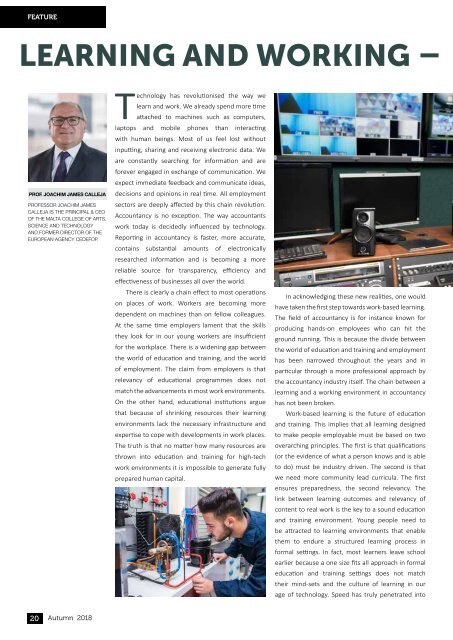THE ACCOUNTANT_AUTUMN_2018_VER-7-L
You also want an ePaper? Increase the reach of your titles
YUMPU automatically turns print PDFs into web optimized ePapers that Google loves.
FEATURE<br />
LEARNING AND WORKING –<br />
PROF. JOACHIM JAMES CALLEJA<br />
PROFESSOR JOACHIM JAMES<br />
CALLEJA IS <strong>THE</strong> PRINCIPAL & CEO<br />
OF <strong>THE</strong> MALTA COLLEGE OF ARTS,<br />
SCIENCE AND TECHNOLOGY<br />
AND FORMER DIRECTOR OF <strong>THE</strong><br />
EUROPEAN AGENCY CEDEFOP.<br />
Technology has revolutionised the way we<br />
learn and work. We already spend more time<br />
attached to machines such as computers,<br />
laptops and mobile phones than interacting<br />
with human beings. Most of us feel lost without<br />
inputting, sharing and receiving electronic data. We<br />
are constantly searching for information and are<br />
forever engaged in exchange of communication. We<br />
expect immediate feedback and communicate ideas,<br />
decisions and opinions in real time. All employment<br />
sectors are deeply affected by this chain revolution.<br />
Accountancy is no exception. The way accountants<br />
work today is decidedly influenced by technology.<br />
Reporting in accountancy is faster, more accurate,<br />
contains substantial amounts of electronically<br />
researched information and is becoming a more<br />
reliable source for transparency, efficiency and<br />
effectiveness of businesses all over the world.<br />
There is clearly a chain effect to most operations<br />
on places of work. Workers are becoming more<br />
dependent on machines than on fellow colleagues.<br />
At the same time employers lament that the skills<br />
they look for in our young workers are insufficient<br />
for the workplace. There is a widening gap between<br />
the world of education and training, and the world<br />
of employment. The claim from employers is that<br />
relevancy of educational programmes does not<br />
match the advancements in most work environments.<br />
On the other hand, educational institutions argue<br />
that because of shrinking resources their learning<br />
environments lack the necessary infrastructure and<br />
expertise to cope with developments in work places.<br />
The truth is that no matter how many resources are<br />
thrown into education and training for high-tech<br />
work environments it is impossible to generate fully<br />
prepared human capital.<br />
In acknowledging these new realities, one would<br />
have taken the first step towards work-based learning.<br />
The field of accountancy is for instance known for<br />
producing hands-on employees who can hit the<br />
ground running. This is because the divide between<br />
the world of education and training and employment<br />
has been narrowed throughout the years and in<br />
particular through a more professional approach by<br />
the accountancy industry itself. The chain between a<br />
learning and a working environment in accountancy<br />
has not been broken.<br />
Work-based learning is the future of education<br />
and training. This implies that all learning designed<br />
to make people employable must be based on two<br />
overarching principles. The first is that qualifications<br />
(or the evidence of what a person knows and is able<br />
to do) must be industry driven. The second is that<br />
we need more community lead curricula. The first<br />
ensures preparedness, the second relevancy. The<br />
link between learning outcomes and relevancy of<br />
content to real work is the key to a sound education<br />
and training environment. Young people need to<br />
be attracted to learning environments that enable<br />
them to endure a structured learning process in<br />
formal settings. In fact, most learners leave school<br />
earlier because a one size fits all approach in formal<br />
education and training settings does not match<br />
their mind-sets and the culture of learning in our<br />
age of technology. Speed has truly penetrated into<br />
20 Autumn <strong>2018</strong>
















